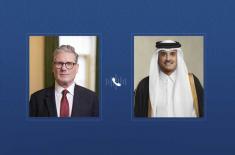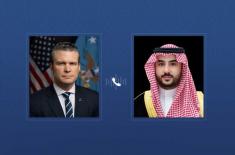
- Home
- World
- Speakers at joint Pakistan Mission-Consulate event renew support to Kashmiris' self-determination
Speakers At Joint Pakistan Mission-Consulate Event Renew Support To Kashmiris' Self-determination
Sumaira FH Published August 06, 2025 | 10:10 PM

Speakers at a gathering held to mark the sixth anniversary of ‘Youm-e-Istehsal’ Kashmir (Day of Exploitation) expressed solidarity with the people of Indian Occupied Kashmir, underscoring that peace in South Asia was not possible without the resolution of the decades-old Kashmir dispute in line with the UN Security Council resolutions and the wishes of Kashmiris
NEW YORK, (APP - UrduPoint / Pakistan Point News - 6th Aug, 2025) Speakers at a gathering held to mark the sixth anniversary of ‘Youm-e-Istehsal’ Kashmir (Day of Exploitation) expressed solidarity with the people of Indian Occupied Kashmir, underscoring that peace in South Asia was not possible without the resolution of the decades-old Kashmir dispute in line with the UN Security Council resolutions and the wishes of Kashmiris.
Held under the theme of “Unresolved Jammu and Kashmir Dispute: A Threat to Regional Peace and Security”, the event was organized by the Permanent Mission of Pakistan to the United Nations and the Consulate General of Pakistan in New York.
Attending were people from different walks of life including academia, media, civil society and Pakistani-American community.
Those who spoke on the occasion included Dr. Asif-ur-Rehman, a Kashmiri leader, Dr. Ghulam Nabi Fai, Secretary General of the World Kashmir Awareness Forum, Dr Abdelhamid Siyam, an academic and senior journalist, Ambassador Hameed Opeloyeru, Permanent Observer of the OIC to the UN as well as Ambassador Asim Iftikhar Ahmad, Permanent Representative of Pakistan to the UN.
Consul General Aamer Ahmad Ataozi delivered the welcome address.
In his keynote address, Ambassador Asim Iftikhar Ahmad pointed out alarming parallels between the policies of Indian Prime Minister Narendra Modi and his Israeli counterpart Benjamin Netanyahu — both uprooting indigenous populations, whether in Kashmir or in Palestine, in a blatant attempt to alter demographic realities and suppress legitimate aspirations.
At the same time, he said that such oppressive designs have never succeeded, nor will they now, noting that India continues to deny its people their inalienable right to self-determination — which is enshrined in numerous UN Security Council resolutions — through demographic engineering, granting domiciles to non-Kashmiris, and manipulating electoral constituencies.
Pakistan, he said, remains resolute in its political, legal, and moral support for the Kashmiri people. "Our diplomacy at the United Nations has focused on safeguarding their rights through three key dimensions: political advocacy, legal support, and human rights monitoring.
In the face of a recent military provocation and the victory in May, Ambassador Asim Iftikhar chose diplomacy over escalation — a decision that reaffirms Pakistan's status as a responsible member of the international community. While India suffered not only a military setback and reputational damage, Pakistan secured a major diplomatic achievement with the unanimous adoption of its resolution on the peaceful settlement of disputes — a significant outcome at a time when the Security Council remains polarized, he said.
The Pakistani envoy said that the resolution drew international attention to he unresolved questions of Jammu and Kashmir and Palestine, and reminded all member states of their obligations under the UN Charter to settle disputes peacefully without the threat or use of force.
He said that Pakistan’s second signature event at the UN, focusing on cooperation between the UN and the Organization of Islamic Cooperation (OIC), further underscored the consistent support of the OIC — the second largest multilateral body — for the Kashmiri people's right to self-determination as well as for peaceful settlement of disputes.
The UN Secretary-General, Antonio Guterres' reaffirmation of the UN’s longstanding position on Jammu and Kashmir as a disputed territory, following India’s illegal actions of August 5, 2019, was significant, he said, noting that the UN’s position is fully aligned with Pakistan’s — grounded in the Charter’s principles and the will of the Kashmiri people.
He said that India’s strategy — to malign Pakistan, suppress Kashmir’s freedom movement, and manipulate domestic political gains — has failed miserably.
Ambassador Asim Iftikhar said that the Kashmiri people had displayed extraordinary courage, sacrifice, and commitment in their struggle for the UN-promised right to self-determination.
“Kashmiris are not alone. Pakistan stands firmly with them and will continue to extend its moral, political and diplomatic support until justice is served, and their legitimate aspirations are fulfilled.”
In his opening statement, Consul General Atoazi paid tributes to Kashmiris for their heroic struggle against the Indian occupation forces.
Despite repression by India, the courage of the Kashmiri people remains undiminished.
He said that their resilience and their unyielding demand for dignity, justice, and freedom continues to inspire. The world should know that the Jammu and Kashmir dispute is not an internal matter of India; rather it is an internationally-recognized dispute that remains on the agenda of the United Nations.
57-member
Ambassador Hameed Opeloyeru, Permanent Observer of the OIC to the UN, stated that the 57-member organization stands in unwavering solidarity with the people of Jammu and Kashmir in their just struggle for self-determination. The OIC, he said, has consistently called upon the international community to resolve the Jammu and Kashmir dispute in accordance with the UN Charter, relevant Security Council resolutions, and the will of the Kashmiri people.
He said that the recent OIC-UN cooperation event hosted by Pakistan as President of the UN Security Council served as a significant platform to reinforce the importance of the peaceful settlement of disputes. The OIC firmly believes that Kashmir remains the root cause of enduring tensions in South Asia. He referred to the recent Council of Foreign Ministers’ meeting in Istanbul, and stated that the adoption of three key resolutions — including the categorical rejected India’s unilateral and illegal actions — reaffirmed the OIC’s principled position on the issue.
Dr. Ghulam Nabi Fai, Secretary General of World Kashmir Awareness Forum, described August 5, 2019 as constituting the darkest chapter in the history of Kashmir. India’s attempts to equate this indigenous freedom movement with terrorism, and to lay blame on Pakistan, have failed to gain international traction, adding that not a single country accepted India's narrative following the Pahlgam incident.
Dr. Fai pointed out that the global discourse on Jammu and Kashmir had shifted, with US President Donald Trump repeatedly offering to mediate the dispute.
The Jammu and Kashmir issue is once again at the forefront of international concern — much to India’s dismay, he said, adding it has not only reemerged as a global issue, but also as a recognized nuclear flashpoint in South Asia, he said, while calling for a meaningful dialogue on Kashmir’s future that includes the Kashmiri people themselves -- the principal party to the dispute.
Dr. Siyam, a senior journalist, said that the freedom struggles of Kashmiris and Palestinians are deeply intertwined — both rooted in the fundamental right to self-determination and resistance against foreign occupation and domination. Today, Prime Ministers Modi and Netanyahu are executing almost identical policies of repression: denying all basic rights, asserting ownership over occupied lands, using disproportionate force, and facilitating state-backed settler expansion.
He said that while Israel occupies 78% of historic Palestine and India controls 58% of Jammu and Kashmir, the pattern remains the same — demographic engineering under the guise of security. He said that in Gaza, over two million people remain trapped like hostages under a brutal blockade, while in Indian Occupied Kashmir, non-Kashmiris are being incentivized to displace the native population — all under the express sanction of state authorities.
Dr. Asif-ur-Rehman stated that Jammu and Kashmir remains an unresolved legacy of partition. He said that after decades of hoping for international support and attention for fulfillment of their rights, Kashmiris have been forced since 1989 to resist India’s brutal occupation marked by extrajudicial killings, rape, and pellet gun attacks.
He said that President Trump’s recent pronouncements offer a rare opportunity for the resolution of the Kashmir dispute, adding that the UN Charter’s principles, especially self-determination and peaceful dispute resolution, remain the most relevant path forward in this regard.
Earlier, special messages from President Asif Ali Zardari, Prime Minister Shehbaz Sahrif and Deputy Prime Minister/Foreign Minister Ishaq Dar were read out on the occasion.
Rabia Ijaz, a second secretary at the Pakistan Mission, conducted the proceedings.
Recent Stories

UAE Ambassador meets ACS Secretary-General to strengthen partnership

Korea logs record high current account surplus in June

UK scientists find genes linked with chronic fatigue syndrome

UAE leaders congratulate President of Côte d'Ivoire on Independence Day

China's foreign trade up 3.5% in first 7 months

ADNOC Distribution delivers strong H1 2025 results with 12% net profit growth

July was Earth's third-hottest on record, scientists say

Currency Rate In Pakistan - Dollar, Euro, Pound, Riyal Rates On 7 August 2025

Today Gold Rate in Pakistan 07 August 2025

Emir of Qatar, UK Prime Minister stress priority of achieving immediate ceasefir ..

Google launches $1 billion AI education initiative

Saudi, US defence ministers discuss efforts to achieve security, stability in re ..
More Stories From World
-
UN chief calls for eradication of nuclear weapons for world peace
2 hours ago -

Trump slaps additional 25% tariff on India over Russian oil purchases — bringing total rate to 50%
11 hours ago -

Speakers at Pakistan embassy webinar condemn India's annexation of Kashmir
12 hours ago -

Aid agencies sound alarm over Israeli move to deregister NGOs operating in Gaza
13 hours ago -

Speakers at joint Pakistan Mission-Consulate event renew support to Kashmiris' self-determination
14 hours ago -

Death toll from hunger, malnutrition in Gaza nears 200 amid ongoing blockade
19 hours ago
-

China, Pakistan ink MoU to establish Global South Research Center
17 hours ago -
Chinese hydropower wisdom to fuel Kurram Tangi Dam development
21 hours ago -
China reiterates call for peaceful resolution of Kashmir issue
22 hours ago -
Gaza crisis deepens as UN warns children are ‘dying before reaching hospital’
22 hours ago -
China reiterates call for peaceful resolution of Kashmir issue
24 hours ago -
Pakistan pushes UNSC to end Israel's 'brutal' war & suffering of Palestinians, especially children
1 day ago





